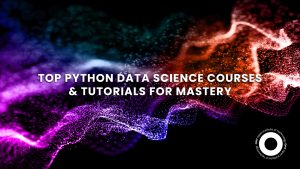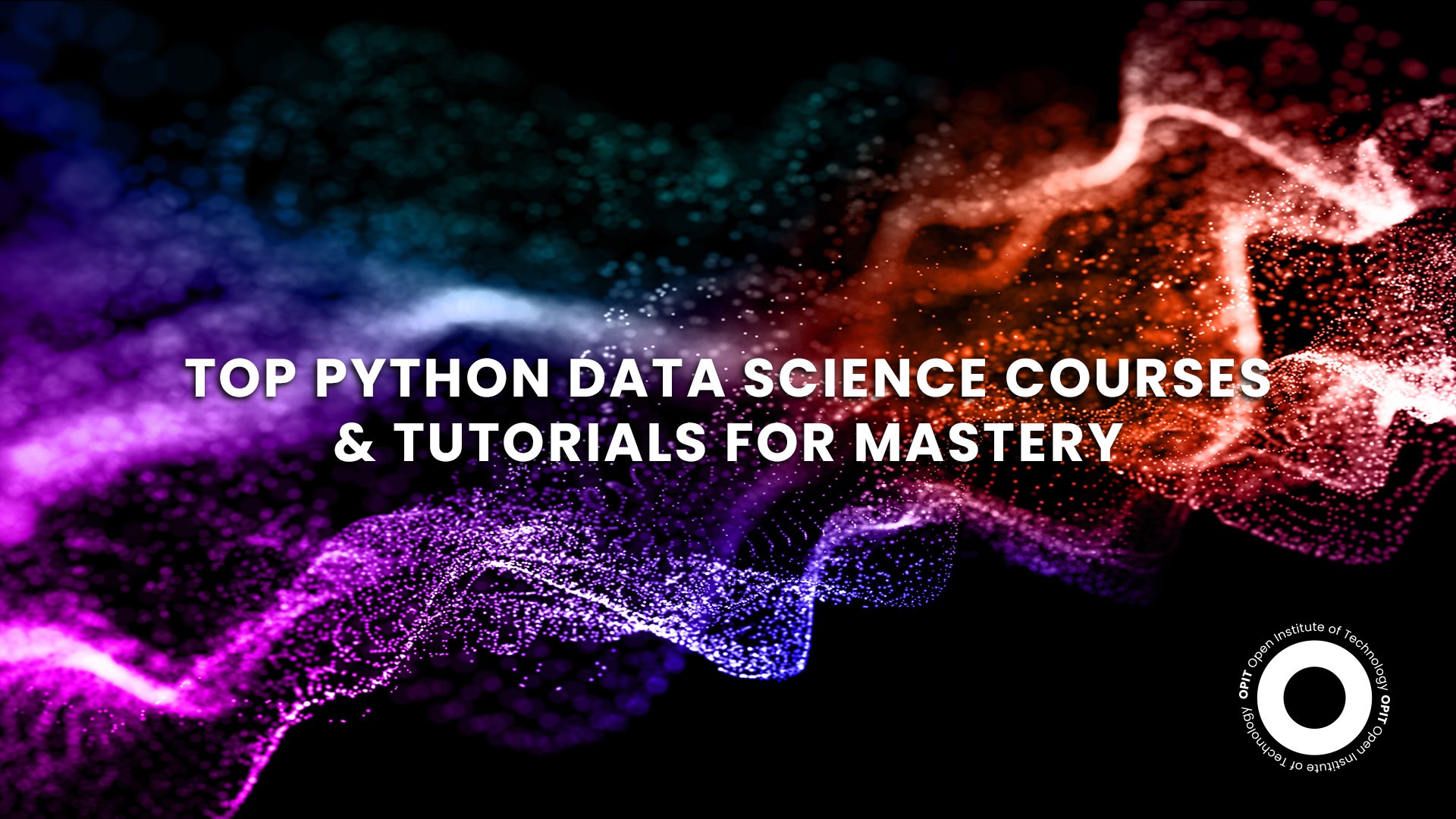

As a well-known programming language, Python dominates the data science field. Its prominence in the industry represents the main reason why so many job offers include Python skills as a hard requirement.
Of course, all of the hype around Python has practical ramifications. This programming language is suitable for people without a programming background. If you have a sufficient grasp of technology, chances are you’ll get how Python works in a few weeks.
Besides being beginner-friendly, Python is practically built for math and statistical analysis. Plus, data visualization becomes nearly effortless when you use specific Python libraries dedicated to the task.
The point is that Python makes numerous data science tasks and operations easier. If you’re interested in data science, learning this versatile programming language will take your professional development to a new level.
Fortunately, you can find plenty of courses teaching everything from the basics to advanced functions in Python. Let’s look at the best Python data science tutorial and course options.
Factors to Consider When Choosing a Python Data Science Course
Before you start a particular course, it would be best to consider the specifics. The criteria that should guide your decision include:
- The content of the course: Some courses will be introductory, while others will offer advanced lessons. You should start with a course that aligns with your proficiency level.
- Instructor’s expertise: Ideally, you’ll want an industry expert to teach you about Python. Experienced lecturers or proven professionals will know all of the ins and outs, and they’ll be able to transfer that knowledge to you.
- Course duration and flexibility: If you’re looking for a course, you don’t want an experience that will last an entire year. On the other hand, you shouldn’t expect too much from an hour-long course. Additionally, the course structure should be flexible enough to allow you to complete it at your own pace.
- Practical projects and applications: Python is a living programming language that sees plenty of use in the real world. On that note, the course you take should offer a hands-on experience and show you how to apply your new knowledge in practice.
- Course reviews and ratings: Although this shouldn’t be your primary clue when making a decision, taking a look at what others say about the course certainly won’t hurt. You’ll want to stay away from courses with mostly negative reviews, especially if the reviewers make unsubstantiated claims.
- Pricing and value: Course pricing may vary from ludicrously expensive to free. While our list doesn’t include any outrageously overpriced courses, you’ll find a quality free one in there. The bottom line here is straightforward: Does the course fit in with your budget and what do you get for the price?
Top Python Data Science Courses and Tutorials
ILX Group – Python E-Learning
This Python data science course deals with the basic functionality of the programming language and teaches you how to apply it in practice. It contains in-depth information about command running, dictionaries, methods, and shell scripting. No final exam is necessary to complete the course.
Key Topics
- The basics of Python programming
- File and data operations
- Logging and test infrastructure
- Conditional statements
- Networking
- Shell scripting
- Django web framework
Instructor’s Background
Information about the instructor for this course isn’t available on ILX Group.
Course Duration and Format
The course is in e-learning format and is delivered entirely online. It will take you about eight hours to complete. Instead of a final exam, you’ll complete the course by submitting the required project that must meet specific set criteria.
Pricing and Enrollment
Enrolling in this course will cost €450 +VAT. You won’t need to fulfill any additional requirements to make a start. Paying the one-time fee will grant you a full year of access to the course resources.
Pros
- Provides a solid foundation for Python programming
- No limitations on enrollment or availability
- Offers practical knowledge and projects
Cons
- E-learning tools used throughout the course aren’t defined
- No information about the instructor or their credentials
Python Institute – Data Analysis Essentials With Python
The Python Institute is a group devoted to Python education. The Data Analysis Essentials with Python is only one of the courses this institution provides. It’s an intermediate-level program focused on data analysis using the tools within the Python programming language.
Key Topics
- Data analysis
- Algorithmic and analytical thinking
- Data visualization
- Statistics
- Data mining and modeling
- Programming
- Data-based decision-making
Instructor’s Background
No instructor information can be found on the Python Institute site regarding this particular course. However, it’s worth mentioning that the institute is run by industry experts with substantial experience in the IT sector. These experts are also responsible for the institute courses.
Course Duration and Format
The Data Analysis Essentials with Python course will last for up to six weeks, provided you devote about eight hours weekly to studying the material. The course is delivered online.
Pricing and Enrollment
One of the greatest advantages of this course is its pricing: Data Analysis Essentials with Python is completely free. However, this course isn’t for beginners. You’ll need previous knowledge of the key concepts in Python programming. The Python Institute recommends completing their beginner courses or coming into this program with some experience.
Pros
- Course designed by industry professionals
- Free for all users
- May serve as a preparatory course for Python Certified Associate in Data Analytics (PCAD) certification
Cons
- No information about the lecturer
- Exact delivery methods aren’t specified
Python-Course – Fundamental Python Course
The Fundamental Python Course is designed as a comprehensive introduction to programming methods in Python. The course will take you through the fundamentals of the programming language and include practical solutions in the Python environment.
Key Topics
- Python introductory lessons
- Script editing and execution
- Working in the Python shell
- Expressions, operators, assignments, and variables
- Dictionaries, stacks, loops, and lists
- Handling files and exceptions
- Conditional statements
- Packages and modules
Instructor’s Background
The instructor for live courses is Bernd Klein. A Python expert with a Saarland University diploma in Computer Science, specializing in computer languages, Klein has taught at the Saarland University, EWH, Koblenz, and the University of Freiburg, where he still holds a teaching position.
Klein is also the founder of the programming language teaching platform, Bodenseo.
Course Duration and Format
The course lasts for five days and includes a live class format. While Klein usually holds classes in person, courses are currently provided online. To participate on this course, you’ll need a network-ready computer with a microphone. No additional software is needed.
Pricing and Enrollment
The on-site variant of the course costs €1,450 per day, while open classes start from €349 daily. There are no other requirements for the course.
Pros
- Taught by an experienced lecturer
- Offers a complete coverage of Python-related subjects
- Advanced optional topics
Cons
- Very pricey compared to the competitors
- Doesn’t provide a certificate
Additional Resources for Mastering Python Data Science
If you want an alternative to an actual Python data science course, you may wish to turn to other resources that will help you master the subject. In particular, these would be books and digital resources like forums, eBooks, podcasts, YouTube channels, websites, and blogs.
For some of the best Python forums and online communities, check out the following:
- Python org forums
- StackOverflow Python forum page
- FreeCodeCamp Python category
Great books on Python include:
- Head-First Python, by Paul Barry
- Think Python, by Allen B. Downey
- Learn Python 3 the Hard Way, by Zed A. Shaw
- Python Crash Course, by Eric Matthes
If printed media isn’t your style, you can find an excellent list of free Python eBooks on Codeburst.io.
On the other hand, you might not want to read too much while learning Python. In that case, you’ll be glad to learn that there are numerous podcasts on the subject that you can tune in to right now:
Unsurprisingly, YouTube also has plenty of Python data science course and tutorial channels. Here are our top picks:
- The New Boston
- Sentdex
- Real Python
- PyCon – This isn’t a particular YouTube channel, but rather a search query. Browse the search results on YouTube, and you’ll find videos for Python-dedicated conferences from around the world.
- Michael Kennedy
Finally, there’s an abundance of blogs and websites dedicated to Python resources and knowledge:
- Python Blogs
- The PyCharm Blog on Jet Brains
- The Invent with Python Blog
- The Python Library Blog
- Finxster
Learn to Program in Python Like a Pro
The internet is full of quality Python data science tutorial and course pages. You can find free and premium resources to hone your skills in the programming language or get familiar with the fundamental concepts.
Whichever resource type you choose, rest assured that learning practical Python skills will be a valuable addition to your resume. After all, data science is a constantly developing field in which expanding your knowledge base and skillset can only be a huge plus. If you’ve found a program you like in this article, don’t hesitate to jump right into it and expand your horizons.
Have questions?
Visit our FAQ page or get in touch with us!
Write us at +39 335 576 0263
Get in touch at hello@opit.com
Talk to one of our Study Advisors
We are international
We can speak in:




